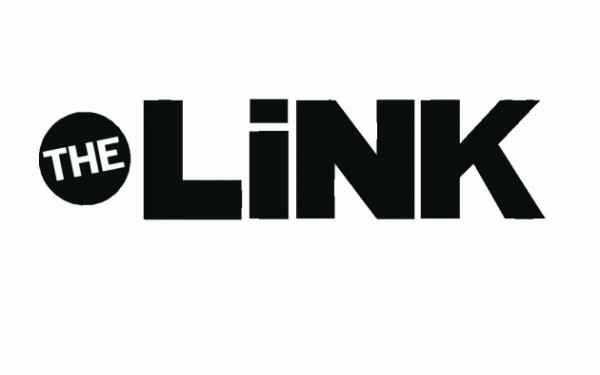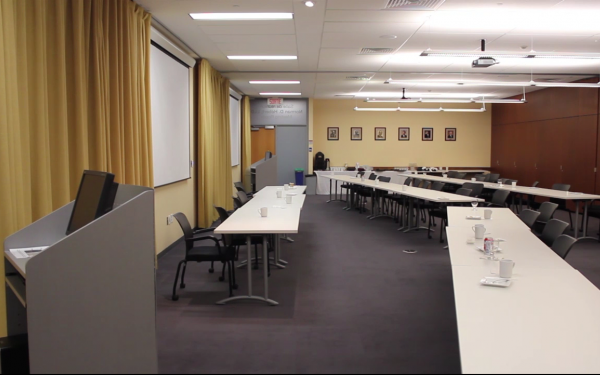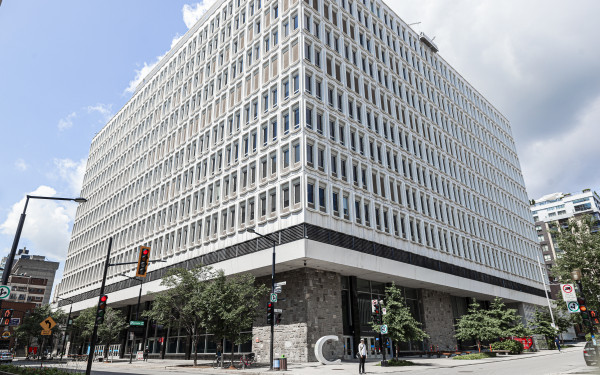Hey BoG, You Want to Talk About Contempt?
I slept in and missed last Thursday’s Board of Governors meeting. But the meetings have become more formulaic than House, and I didn’t need to actually sit through another episode to know how this mess would play out.
The chair, Peter Kruyt, would continue his Guinness-worthy streak of terrific douchebaggery. The board would contemplate their fingernails, half-asleep, as students asked for some minor concession. And eventually the rich, old folks who run this school would vote to do something short-sighted and stupid. Surprise.
As always, things got off to an ugly start. The university had moved the meeting to some janitor’s closet in the Hall Building, where there was just enough room for the Board members and Peter Kruyt’s massive ego.
Students and reporters who wanted to watch this month’s fiasco were shuffled off to another room to watch a laggy live-stream with a funny tendency to drop the audio every time our student reps opened their mouths.
Back in November, Graduate Students’ Association rep Erik Chevrier asked the Board to approve a modest series of motions: that all meetings have 50 seats open to the public, that each meeting have at least a 20-minute question period, that closed-session discussions remain secret and that Board meetings be filmed and broadcast online.
Not too crazy. But the Board was decidedly unhappy about the idea. Watching their reaction, you would have thought Chevrier had just busted down the door, his Lemmy-esque locks flowing wildly in the breeze, screaming “Up against the wall, motherfuckers!” and demanding Kruyt’s head on a plate.
After settling some initial confusion about how the Internet works, the Board members generally agreed that there was no need to be too hasty, and that it would be best to study this strange madness before doing anything rash.
After a few months, Concordia’s crack legal team produced a report that in 565 words essentially said, “I dunno, what do you think?”
Acknowledging that Board meetings might be considered public events and therefore legal to film, the university’s counsel noted a few paragraphs later that, on the other hand, they might not. I’m so glad we pay these people so much money.
The legal question is simple. Students are allowed into the meetings. Reporters take notes, record audio and sometimes shoot video. The only way these events could be more public is if Board members were required to show up naked. As Concordia’s lawyers noted, filming and broadcasting public events is legal.
Almost every time Concordia is mentioned in the national media, it’s quickly followed by some mention of governance problems, the “culture of contempt” and Judith Woodsworth’s ‘controversial’ departure.
Despite the university’s frequent cheery news releases about our improving reputation, things are pretty grim. If admin bailed out Bernie Madoff and appointed him president, the rest of the country would be mildly surprised for a day or two, chuckle a bit—and still send their kids to another school.
Over and over again, the recommendation has been to make the university’s dealings more open and accountable. By supporting Chevrier’s motions, the Board could have made a small, important step toward rehabilitating Concordia’s bruised reputation.
But they just don’t care. “Transparency does not equal good governance,” said Peter “Judge Dredd” Kruyt to The Link after the last Board meeting.
Of course he would say that. Given the incredible ability of many board members to stuff both of their feet in their mouths at once, lack of transparency is the only thing keeping them in a job.
We all know the Board of Governors—with the one mustachioed exception of our Provost, David Graham—don’t give a shit about students. But every month it’s becoming more and more obvious that they can’t even be bothered to pretend to care about this school we pay for.
Can’t we fire these people?







